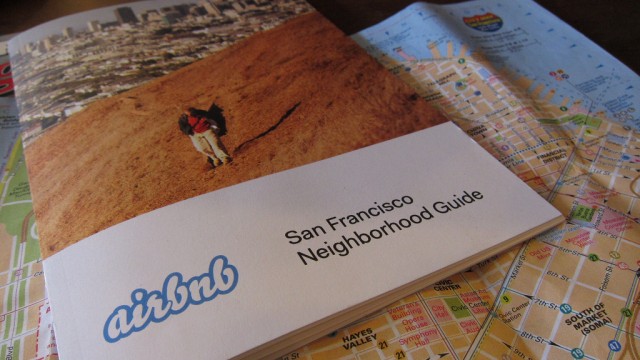
Backers of a measure that would strictly regulate short-term rental site Airbnb and similar services won't try to place their initiative on San Francisco's November ballot.
“We had made an attempt to go the legislative route before we began circulating the petitions to put the measure on the ballot, and we had those discussions even while we were on the streets,” said Dale Carlson, one of the measure's proponents. “We were not able to reach an accommodation with Supervisor David Chiu. But then, last week, he asked the Planning Commission to postpone consideration of his legislation [to set local regulations for Airbnb], and thought, 'Well, perhaps there is still an opportunity to work something out legislatively.' ”
Carlson said he will work with the Board of Supervisors and Mayor Ed Lee's office over the next several months to craft regulations for Airbnb. If an agreement can’t be worked out, Carlson says he will resubmit signatures by this November to get the measure on the November 2015 ballot.
“The measure was intended to provide a degree of regulation over short-term rentals of residences to tourists, and we’ve got somewhere between 10,000 and 15,000 condos, apartments and homes that are being offered on more than 60 websites to tourists,” Carlson said. “They’re all offered illegally, and the city is not collecting hotel taxes on them, and it’s hurting the affordability crisis in the city.”
Carlson told KQED that, beyond creating a registry for people who want to offer short-term rentals, there are major differences between what rules he'd like to see the city adopt and Chiu's proposal:
David wants to rezone the entire city so that short-term rentals are legal in every residential neighborhood across town. We don’t want to do that. David wants his registry to be essentially private. You could request to see it, but when the city showed it to you the names of the people offering short-term rentals to tourists would be redacted. Our proposal is that should all be public. Building permits are public, business licenses are public. There’s no reason to keep these names hidden. We require permission from landlords before tenants sublet their units to tourists. David didn’t want to do that either.”
The ballot measure was also backed by housing activist Calvin Welch and former planning commissioner Doug Engmann, according to the San Francisco Chronicle. More on the proposed ballot measure from the Chronicle:
The ballot proposal would have required San Francisco hosts to comply with current — largely ignored — laws that require people offering short-term rentals to apply for a bed and breakfast license, an expensive and cumbersome process. People in areas zoned for single-family residential use — like much of the city west of Van Ness Avenue — could not even apply.
“The ballot initiative contains many land mines that make home sharing not just difficult but virtually impossible,” said Peter Kwan, a retired educator who founded Home Sharers of San Francisco, a 1,000-member organization for Airbnb hosts. “A vast majority of people who are currently doing home sharing would have to stop, because they’d either be banned or, if not, to go through those hoops would be too burdensome.”
Kwan said he was relieved that the proposal is not moving forward.
Under the proposal, tenants renting via Airbnb would have had to show written permission from their landlords. Many property owners dislike having tenants rent via Airbnb because of concerns about security, and wear and tear. Landlords increasingly have issued eviction notices to tenants renting on Airbnb, either because they are violating lease prohibitions against subletting, or on the grounds that they are committing illegal acts by flouting the city’s ban on short-term rentals.The initiative would have prohibited short-term rentals in in-law apartments, affordable housing units, apartments that were subject to an Ellis Act eviction, and units that received affordable housing funds from city, state or federal agencies. Theoretically, that latter provision could bar homeowners with Federal Housing Administration (FHA) mortgages — a common loan for lower-income people — from offering short-term rentals, for instance.
“The city has known that short-term rentals to tourists is a problem, and the problem is getting worse, and the city has known this for well more than two years," Carlson said. "And there’s been very ineffective enforcement of the laws that are on the books right now. So we are interested in seeing the city rein in this activity because it is hurting the affordability of the city.”